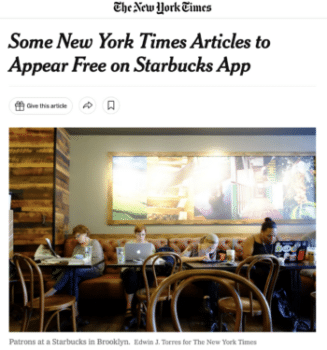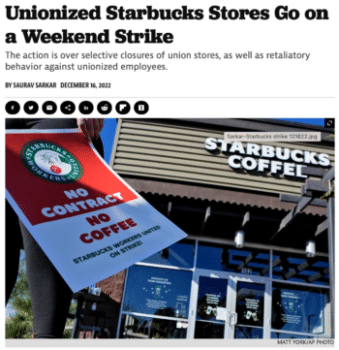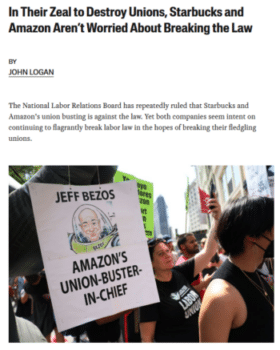Janine Jackson interviewed journalist Saurav Sarkar about Starbucks organizing for the April 7, 2023, episode of CounterSpin. This is a lightly edited transcript.
Janine Jackson: Who remembers back in 2000 when the New York Times announced that they had—quoting the paper now—“agreed to the sale of the New York Times newspapers in Starbucks stores for three years in exchange for the Times’ advertising promotion of Starbucks. Financial terms were not disclosed.”
Or 2015, when Starbucks announced an “elevated digital news experience” based on an expanded relationship with the New York Times. Now the coffee company’s loyal customers could get free access to the Times’ top stories of the day, via the Starbucks app, as well as the chance to “earn” “stars” by buying a Times subscription.
We are now to look to the New York Timesfor serious independent scrutiny of its former profit partner, as Starbucks finds the bloom off its rose with workers, the National Labor Relations Board and ever-larger swaths of the public denouncing its attempt to squash union organizing.
Maybe add some different news sources to your list, is all I’m saying, including those who never fell for the $113 billion company’s humble, progressive, “who needs a union when we’re all family here” shtick in the first place.
Saurav Sarkar is a movement writer, editor and activist who’s been reporting on Starbucks worker efforts for workplace rights and voice for a while now. They join us now by phone. Welcome to CounterSpin, Saurav Sarkar.

The New York Times’ (7/21/15) chief executive was “delighted” with an extension of its “long and fruitful association with Starbucks.”
Saurav Sarkar: Thanks so much for having me.
JJ: I don’t wish struggling against a behemoth like Starbucks, like Amazon, on anybody. But from the outside, it’s hard not to get really excited, because these are the companies that self-declare as the way of the future. So exposing what makes that model run is critical.
For me, the intelligence and the energy of these workers is just such a breath of air and hope. But I know that there’s not just time and sweat, but fear and precarity and danger behind this work. You’ve been close-up reporting these efforts. These workers see how big a thing they’re part of, don’t they?
SS: You know, I think they increasingly do. I think towards the beginning, there wasn’t as much of a sense among the workers of exactly the size of what they were doing, and the enormity of what they were taking on.
And I think that they were organizing maybe a couple dozen people in their own store, and that’s sort of the scale that they were looking at it, and they were joining up with other people who were organizing in other stores.
But over time, it became clearer, I think, that this was really a nationwide struggle. It didn’t take too long for that to happen, but it didn’t happen immediately. That’s my sense, anyway.
But now I would say that, especially during the testimony that Howard Schultz just had at the Senate Health Committee, a lot of baristas told me that they felt a sense of community. They really enjoyed being with one another.
And you have to remember, they’re spread out all over the country, so a lot of their organizing work happens on Zoom. They’re very close and tightly knit with people in their own store, and maybe people in their local area, but as a national movement, they don’t get to see each other all that much. So I think their sense of oneness and togetherness has really grown over time.
JJ: Just as a point of information, the baristas don’t have quite a union yet? What is the status of their organized entity? What’s going on there?

The American Prospect (12/16/22)
SS: They have a network, which is called Starbucks Workers United, and that network is attached to Workers United. Workers United is a union, and so when they are joining the union, when a store decides to unionize, they become Workers United members.
And then Workers United itself is an affiliate of SEIU, which is a large, major union.
JJ: Of course. Well, let’s come back to Howard Schultz’s recent congressional testimony. He didn’t want to testify; he was subpoenaed.
I have read accounts about how he looked goofy for invoking his father’s workplace injury as somehow an anti-union argument, and for whining about being called a billionaire, because to him, somehow just having billions of dollars doesn’t warrant that label.
But you know, Howard Schultz can stand to look awkward for an hour, and then ride off in his gold limousine.
What do you think might be the impact of this hearing? And then just generally, how do you think about congressional action vis-a-vis shop-to-shop organizing? I mean, it’s not an either/or, but maybe a both/and. What did you get from that testimony?
SS: Well, to start with the testimony, I think other people thought that he did worse than I did. I thought he managed to escape relatively unscathed.
There was a fair amount of questioning of him, but the contrast I draw is between something like an intervention, rather than something like a courtroom interrogation. And I really felt like many of the Democratic senators that were asking him questions were trying to cajole him, to teach him to be a better CEO.
And then, on the other side, there were obviously the Republican senators, and with the exception of one, I think, all of them took the position that you would expect them to take, which is that they were wholeheartedly in support of Starbucks, wholeheartedly in support of Schultz, questioning why they even needed to have a hearing, questioning the credibility of the NLRB, trying to muddy the waters and make it seem like this was really about Starbucks versus the NLRB.
But I didn’t think that Schultz fared that badly in the hearing. But after the hearing, I was surprised with—just because I’ve been immersed in this area, I’ve basically assigned it to myself as a beat, as a freelancer. And I’ve been immersed in this for about a year, maybe a little bit longer.
I was struck by how much more attention the general public was paying to these issues. You know, a barista told me that at her store, right after the hearing, when she went in, customers were coming up to her and asking her whether things that had been said were true or not. I saw, I believe it was, Mark Ruffalo on Twitter, had shared a petition from the Starbucks workers.
So it definitely seemed like it escalated the campaign in the public eye, and I think that’s a positive thing for the Starbucks workers’ movement. I think the more public exposure there is to this issue, the better it’s going to be for them.
JJ: Just to be clear, we are not talking here about company policy. That’s not exactly what’s at issue—not things that Starbucks does as a company that we might disagree with. We really are talking about violations of law, of labor law, and I don’t want that to be lost.

Jacobin (9/28/22)
SS: Right. I mean, it’s both. But there are enormous numbers of violations of labor law that Starbucks is engaging in.
And this is actually an example of where I thought the senators could have gone further. So there was a lot of talk about the NLRB, and the number of judgments. There was a recent judgment from Buffalo that an administrative law judge issued, that was I think 200 pages long, something like that, and that judge found egregious and widespread misconduct by Starbucks, and there were a whole range of remedies that were ordered.
But the senators didn’t focus on the fact that, at least in one instance, a federal court has also found that Starbucks violated labor law.
And so a lot of the defenses that were mounted by Schultz at the hearing, like, “Oh, this is in litigation, oh, we’re not sure that this is true, we think we didn’t break the law, and that settles the matter.”
It’s almost Trumpian in how it denies the reality of what’s actually happening. Basically, the attitude seems to be that anything that challenged or contradicted what he thought should be the case was not credible, and obviously that’s not the case in the real world.
JJ: And that’s where you look for journalists to step in and separate—you know, you can call something an allegation, but, in fact, if the word “fact” means anything, then you can apply it.
SS: Exactly.
JJ: As much as the bravery of the workers these past months has highlighted the deep skeeviness of the company—“we’re all partners here, but if you try to get together with other partners, well then us partners are going to fire all of you partners,” you know? “But remember that rainbow coffee cup we did that time?”
I really feel that if we can pierce PR this thick, this committed, this well-funded, then we’re really onto developing some useful skills.
SS: I think that’s definitely the case, and I think actually the PR works in the favor of the labor movement. I think it’s actually easier to go after a company like Starbucks, as massive as it is, because they’re putting themselves out as a progressive company.
So then you can go right back at them and say, “Well, if you’re a progressive company, then why are you doing X, Y and Z?” Whereas a company like, say, Walmart, that makes no pretense to that, it would be harder to hold them to a standard.
So, for example, Starbucks brags about the trans-friendly healthcare benefits that it has, but then it wields the potential loss of those benefits over the heads of trans workers who are part of the union drive. Now, that wouldn’t happen if Starbucks, in the first place, didn’t say, “Well, we’re trans-friendly.”
JJ: We find corporate media’s playing off of workers versus consumers to be among their most damaging frames, and you write about labor and its multiple intersections.
So how do you avoid that framing, especially when, you know, people are crossing picket lines to get their caramel frappuccino? How do you present the story in a way that doesn’t pit workers versus consumers?
SS: I think workers and consumers have the same foe in this instance. I mean, workers are consumers and consumers are workers. There’s really no reason to pit them against each other. So that’s from my personal standpoint.
But then, in addition, I really take to heart the approach and the mentality that the workers themselves have towards these kinds of issues. And they’re not, like, standing outside of Starbucks with metal rods, going after consumers who are crossing a picket line.
As much as they might be displeased at what people do, they also—this is the point I actually meant to make in the course of the interview at some point, that they’re among the nicest, warmest people you’re ever going to meet. It’s a pure joy to be covering this beat, because of the workers that I talk to.
And they genuinely value their relationships with their customers. And so I don’t think that there’s a downside to unionization for the customers themselves. If anything, I think their customer experience would probably improve, or at least that’s the sense that the baristas have.
JJ: And this is what I’m thinking about, because I do think that journalism could lift up, instead of these templates that say, oh, well, you might want workers to have a union, or to have a voice in the workplace, but do you want to pay 27 more cents for your blah, blah, blah?
I feel like that’s old. I feel like folks are not falling for that anymore. So I’m happy to hear you say that that kind of framing is passé. And we should resist it when we find it in reporting.
SS: Yeah, definitely that’s the case. And also I think that the workers themselves, and the unions, have gone out of their way to point out that, you know, you’re not happy about waiting an inordinate amount of time for your drink at Starbucks. And if they weren’t short-staffed, you wouldn’t have to wait.
If they didn’t have mobile orders going all the time, and not being able to turn them off, just because a district manager or a manager says that they can’t be turned off, then you wouldn’t necessarily have to wait as long.
It might not be as crowded. You’d get your drink faster, your drink would be prepared with a greater amount of care, because the barista would have, most likely, more time to prepare the drink.
So it really is in the consumer’s interest, in this case. And I think a lot of the consumers who go to Starbucks also go to Starbucks because of that progressive branding. I mean, there are plenty of people who just go to Starbucks because they just want the coffee, but you can get coffee almost anywhere, right? So why are you going to Starbucks? Some of the people who go to Starbucks go because the company holds itself out as a decent company.
JJ: And we ought to hold them up to that standard. And I guess what I’m saying, or what I’m hoping for, is that journalism would invest itself in making Starbucks transparent, and really live up to the claims that they make, and also that we would lift up, in general, our demands and our understanding of what it means for a company to really call itself progressive, and to not just allow that to be a label.
SS: Absolutely. I absolutely agree with that.
JJ: What do you see going forward? What the outcome of the Schultz hearing seemed to be was, he was being asked to do some things, and he was like, “Pfft—I’m not doing that.”
So it seems like it goes back down to shop-to-shop, and I know you’re going to keep reporting it. What would you ask folks to look out for, in terms of reporting? What would you like to see more of, or less of, in terms of public understanding of what’s going on in this very, very important worker rights fight?
SS: Something that I would really love to see more of—and I would include myself in this category, actually—is just more reporting about the baristas themselves and their lives, what it’s like to work in a Starbucks. I see baristas posting things on Twitter that have a level of detail and nuance to what it’s like to actually work in the store that I don’t see communicated in most of the stories.
And journalists have a limited amount of space, and they’re writing about particular kinds of news. But at a certain point, we have to stop telling the same story over and over, and start really getting in-depth into what is actually making these workers tick.
What are they like, why do they want to unionize? What differentiates them from other industries? What’s similar to other industries? That’s something that I think would be very welcome.
And I think that that would be useful, both to readership and viewership, as well as to the union movement, in terms of understanding like, hey, these are actual human beings. They’re not just people that serve you a drink for three minutes.
JJ: We’ve been speaking with activist, writer and editor Saurav Sarkar. You can find their varied work on their site, SauravSarkar.com. Thank you so much, Saurav, for joining us this week on CounterSpin.
SS: Thank you so much for having me.

